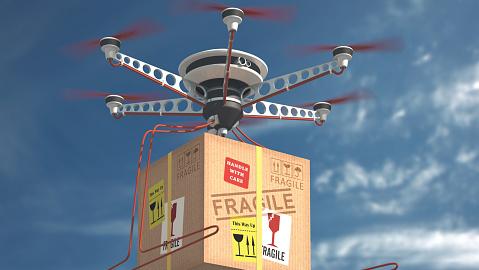
According to slate.com, drone delivery is one of the business ideas that suddenly makes a lot more sense in the age of covid-19. Urban Air Mobility News is covering an increasing number of stories highlighting how such deliveries from the sky during the new world remits of lockdown and social distancing is proving not just essential, but also popular and successful.
Bloomberg.com reported recently that Wing, Alphabet’s drone delivery service, is seeing a big uptick in orders in the Christiansburg area of Virginia. Wing works with FedEx and Walgreens to deliver household essentials and has also added a local bakery and coffee shop to expand offerings during the pandemic.
The service claims that the volume of consignments has doubled amid the crisis, and Christiansburg’s Mockingbird Cafe and Bakery reports that it’s sold 50 percent more pastries thanks to these deliveries. The drones can complete dispatchments within minutes, though they’re limited in how much they can carry per order. One happy customer, Shane Ross, tweeted: “Drone delivery to me & my dog at home. My 8-month-old Labrador was unperturbed by the drone, but curious and eager to go fetch the package (dog food?). The delivery was from Walgreens via Wing & arrived 5 minutes after placing the order.”
A similar phenomenon is playing out in cities around the world. Wing’s trials in Canberra, Australia, and Helsinki, Finland, have also seen an increase in business. The Chinese e-commerce giant JD.com also stepped up its drone programme for routine last-mile grocery and consumer product deliveries to the country’s rural villages and semi-isolated islands.
On the back of this increasing popularity, other start-ups are trying to work with regulators to fast-track the launch of their services. After setting up shop in Rwanda in 2016, the medical drone delivery company Zipline says it is now working with American regulators to speed up the approval process so it can help expedite supply chains in the country. The drone company Manna Aero, also got permission from Ireland’s aviation authorities for a trial to deliver prescription medications to elderly and immune-compromised people in early April. And the Ontario provincial government classified Drone Delivery Canada as an essential workplace allowing the company to continue normal business operations and transport pharmaceutical supplies and blood samples for remote communities, particularly Aboriginal ones.
None of this means that drones are about to take the place of Instacart and DoorDash workers. As Inverse reports, regulations in the US aren’t likely to loosen quickly or dramatically enough to allow drones to fill the sky and solve a lot of the transportation bottlenecks caused by the coronavirus in the near future.
One of the toughest restrictions to get a waiver for is visual line of sight, which dictates that a firm’s drone operator must be able to see the aircraft in person at all times, thus limiting the distance that it can travel.
But, it is possible that the coronavirus will convince the Federal Aviation authority (FAA), which usually rejects 99 percent of applications, to grant more beyond visual line of sight approvals in the long run. (Wing won approval in 2019.) In April, the FAA granted exemptions to its commercial drone prohibitions to 30 companies, including Amazon, which is still in the research and development phase for its Prime Air service.
So, whether during lockdown it is a rose being delivered by drone in Haret Sakher, Lebanon from a lover or essential toilet paper to a friend in need in New York, America, love, life, food and vital supplies continue unabated when ‘Delivery Drones are GO!’
https://www.youtube.com/watch?v=BfIAKj3Gl1E
For more visual information

